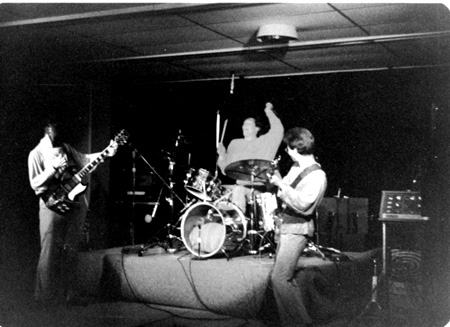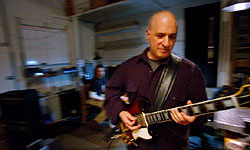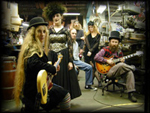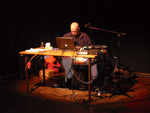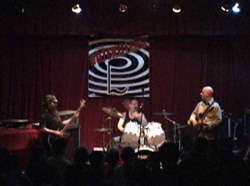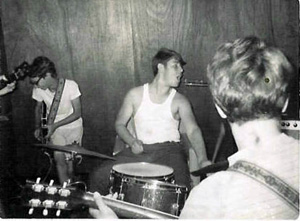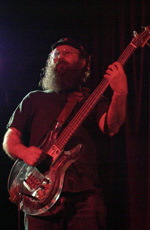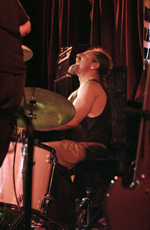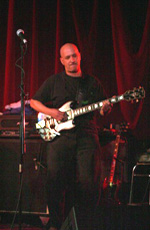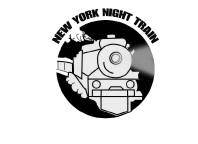
 |
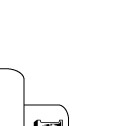 |
|||||||||||||||||
| June 2006: SPOTLIGHT ON... NOTEKILLERS ON RETURNING: A CONVERSATION WITH DAVID FIRST
Since
Moore released a
compilation of their early work last year, the band's
regular gigging and recording show them very much at the top of
their game. Here I ask Notekillers guitarist David
First about the details of this unlikely and fascinating
time-travel story: a tight group of three musical friends who separate
in frustration after years of toiling in obscurity reunite a quarter-century
later to find that music has almost caught up with them…. How did you spend the last twenty-five years in between being Notekillers?
Halkin stopped playing for years. Then, about five years prior to the NK reunion he joined a soul/r&b band – which I think was an excellent way for him to get back in the game. I’m less clear on the chronology of Bilenky’s escapades. Seems like, especially in recent years, he was playing guitar and bass in a variety of bands including one that revolved around the employees in his bike business. As for me, after a couple of years of getting my head back on straight when the NK’s dissolved, I headed up to New York City. At first I was doing a singer-songwriter thing, but soon enough I threw myself deep into more experimental waters. Since somewhere in the mid-80’s I suppose I’ve been mostly known as a composer working a lot with drones, electronics and microtonality. I’ve had various ensembles including one called The World Casio Quartet and another called the Joy Buzzers. I’ve played mostly around NYC and have toured Europe a bunch of times doing music for theater & dance, making sound installations, creating an opera, getting grants and commissions – basically, the whole non-profit, dot-org scene. In fact, I’m still doing this kind of stuff. I have 3-cd set of drone music coming out on Phill Niblock’s XI label this fall. But strangely, or maybe not so, around the same time that Halkin picked up his sticks again and Bilenky’s musical activity increased, I began working again with much more rhythmic & song oriented ideas. I guess we were all getting ready for something. What led you decide to go at it again? We knew for a while that our old stuff was gonna get out there before I brought up the idea. I can’t really explain what I was thinking except it all of the sudden started seeming like something I had to at least try. You gotta understand – if anyone would have told me five years ago that I’d be doing this with these guys I would have said they were completely out of their minds. But everything about this NK re-discovery was already so insane, that it was like, “what the fuck – let’s see how far this bubble will stretch.” And how did it all unfold? Sometime in 2003 – a year or so after the news of Thurston’s salute - I jammed with Halkin for the first time since the early 80’s. We just improv’d – no songs. Then in the spring of 2004 – with the release imminent - the three of got together with the intention of actually checking out some material. I chose three songs and asked the guys to listen to the tapes and get their parts together. It was pretty terrible at first. But I reckon there was some kinda ray of light because we did it again and started doing it on a weekly basis. By that summer we were gigging.
Were all of the members equally enthusiastic about the reunion? I’d say that Bilenky – who I had talked to maybe once in the ensuing years - was the most gung ho. Think he was ready to go as soon as I called him about the Mojo thing. It was a bit more of a hard sell with Halkin – he just didn’t think he could pull that shit off again. I too had my own doubts. Even though I had continued playing music – some pretty aggressive stuff sometimes – it was nothing like NK stuff. There was a time that even thinking about playing a Notekillers song made my hands cramp up from muscle memory. I just kept figuring we could do something, even if it wasn’t what we were doing last time. If we couldn’t do those songs, I figured I’d just say we didn’t wanna live in the past or some bullshit. Any other apprehensions? Well, obviously we wanted to try and avoid seeming like a bunch of old fools. And this stuff was tough to do half our lives ago. It very nearly did me in. So, there was absolutely no reason to think the whole idea was a good one. But everyone – I’d say especially Halkin – has put in a lot of individual work to get his act together. It’s a very simple thing we try to do. We like to joke that it doesn’t take musical “chops” – it takes chop. It means applying every drop of energy and concentration we can muster. The songs cannot be played unless we throw ourselves over the cliff every single time. And how is this time different than the first? I think we’ve all learned a couple things since the old days. Speaking for myself, I think I’m a more attentive and probably much tougher bandleader than I was. I don’t remember yelling back then! I think we all listen better now and understand a little more about the function of our instruments and equipment. The monkeys have learned to type a little, you know? But still, if you asked any of us, it’s all about the laughs. I’d say, for sure, the biggest risk we took in getting in the same room together again was finding out if we could still crack each other up. It would have been completely understandable if the music would have continued to suck. But, man, if any one of us wasn’t funny anymore…I can’t tell you how sad that would have been. So you think the relationships within the band haven’t changed? Well, obviously a lot of life has gone down in the past 25 years. Friends & relatives have died, people have married, had kids, divorced, re-married, re-divorced, changed jobs, developed careers. All three of us took fairly divergent paths after we broke up. I think we’ve all grown a little – maybe not as much as our various significant others would have liked sometimes, but some amount for sure. We have responsibilities now. And yet, sometimes it feels like everything between 1981 and 2004 can be stuffed into a giant pair of parentheses – like, “ok, so what was all that about?” It’s real easy to look around the room – especially if we’re being visited by any other members of the tribe from back in the day – and feel like we’re back in high school and even earlier. I’ve been friends with Halkin since we were eight and Bilenky not long after that. We all grew up a few blocks from each other. So when I use the word tribe, I’m not exactly being metaphorical.
And how has your personal approach towards the material evolved since last time? Well, I’d say that even though, by the time of the first incarnation, I had already been messing with various jazz theories for a few years, I was still pretty ignorant to some of the subtler weirdnesses we were pulling off. Now, after twenty years of being a composer – where the idea is to be able to tell others what you want to make happen – I can more readily analyze and explain certain things. I know the math behind certain rhythmic effects and I can dial up secret frequency relationships that I used to only be able to intuit. But, I have never not considered myself a rock musician. No matter what tools I’ve worked with, the agenda is still the same – do these sounds make me leave my body? Do they send a chill up my spine? Do they make my head spin and my ass twitch? The direct physical impact – the sensuality of vibrations – was and is still the only thing that matters to me. I think it all come down to the art of controlling surprise. For us now, the twin goals have been to push even further on the high-wire aspects of the band – the improv sections and the loopy structural components - while at the same time becoming steadier & more reliable. Our ability to navigate a stage, work equipment, change tunings, deliver a coherent set, is way beyond what we pulled off back then. In all honesty, there may have been a certain amount of justification for people not “getting us” back then. I don’t think there’s much doubt that we are better now! What are some of the ideas behind the upcoming record? How have those concepts evolved since 1981? Well, the
first thing I told these guys was that if we were going to do this
again, it had to be creative. I didn’t wanna be no half-assed
oldies act or a NK’s tribute band. There would have to be
new songs and new approaches to songs. Some of the new songs are
freer than anything we’ve ever done and some are more severely
minimalist. I’ve added a couple of new tunings and am using
a wider array of chord shapes compared to last time. Just trying
to be more, more, more in every direction. In the end, though, there
is still only one golden rule – does it rock major-ass or
not? We started doing the odd-meters and dissonances because they
made things hotter – not to demonstrate some kinda musically
cute progressive theories. And the reception this time around?
I gotta say, the response has been incredible. College radio is still playing the Ecstatic Peace CD almost two years later, as well as the new stuff we released last spring. Music writers have said some lovely things about our place in music history. And, yeah, sure, the Thurston thing helped prime peoples’ reactions. But the most fun thing is when people who have no idea who we are come up to us after a show and babble thank you’s for what we did. That’s when we really know that people are just plain getting it now. The range of responses used to run from stony silence to having stuff thrown at us. Now they scream. It’s an enjoyable difference. Since you’ve been doing your thing in performance spaces, galleries, and concert halls, what’s it like returning to the rock venue stages? Well, I get home a lot later from gigs! And there’s also much less time to set up. In the concert world, you show up with your stuff in the late afternoon and have at least a couple of hours to sound-check and sometimes even rehearse for your show. In the clubs, you get maybe 20mins and quite often, there’s no sound-check at all. It’s plug-in and play – sometimes on equipment that’s not even yours! But, you get to play a fuck of a lot louder in clubs and run around and go nuts onstage. It’s a blast! Have you discovered any new bands you like in the process? I suppose I’m still mostly drawn to things where people are trying to trip me out or make my body feel like it’s gonna explode. Lightning Bolt completely blows me away with their radical speed metal-noise hybrid and their guerilla approach to live performance. There’s a band in NYC called New Humans. They’re all visual artists who have a very strong hyper-minimalist sound and a unique presentation. Dragon City is a Philly band that I really dig - they create very beautiful drone structures and processed guitar textures. I recently played on a few dates with the Seattle band Shoplifting who do these incredible funky, Beefheart type jams – they’re all great players and a great band – which isn’t always the same thing. And there’s some bands I really dig that do cool things with electronics and loops – something I’m always threatening to bring into the NK’s. One that most people probably know is Enon – cool grooves & textures and VERY cool people. Others I like in this vein are my friend Steve Silverstein’s band - Christmas Decorations, Child Abuse and Dragons of Zynth. How is the underground rock scene different now than it was when you abandoned it in 1981? The one thing that I notice and dig is that everyone – audience & players alike – is a lot more open. It seems like everybody listens to everything. I’ve been around long enough to have experienced both the so-called hippie & punk eras. And while, obviously, some amazing music went down during both these periods, there were some very annoying dogmas & prejudices in place. Dress codes. Hair lengths and styles. Attitudes. I don’t feel these kind of vibes at all now. Maybe it’s just due to the passage of time, but I’ve seen plenty of examples of kids having just the wackiest combinations of stuff in their collections from all eras and the latest, most blatantly commercial top 40 pop confections. Not to mention the open embrace of jazz, country, classical avant types and every fringe element and forgotten pioneer that the internet can reveal & catalogue. These kids will even listen to old people for god’s sake! It’s like the last 50 years of music is one big iPod to them. Anyway, clearly music is still a very important element of their life. But another difference between now & then, is that it feels like while some musicians may be looked to for inspiration, I don’t think they’re treated as if they actually have any answers. Which is a good thing. I think the average person feels more empowered and that the playing field has been leveled in many ways. That’s not to say there aren’t ridiculous disparities between the haves and the have nots. In fact, it’s probably worse than ever. But everyone has access to many of the same tools and communication networks and anyone can post an mp3 or a video clip or blog and even see it become part of the international media scene. And how does all of this apply to the Notekillers? I really don’t know where we fit into all this craziness. I think it’s quite possible that the most important thing we may have to share - besides our music - is the idea that you don’t have to stop expanding & developing, and yes, rocking. That, and, yeah, the crazy lesson that sometimes you can even give up on your dreams and they still won’t give up on you!
Go back to NYNT's Notekillers homepage
|
 |
|||||||||||||||||
 |
||||||||||||||||||
